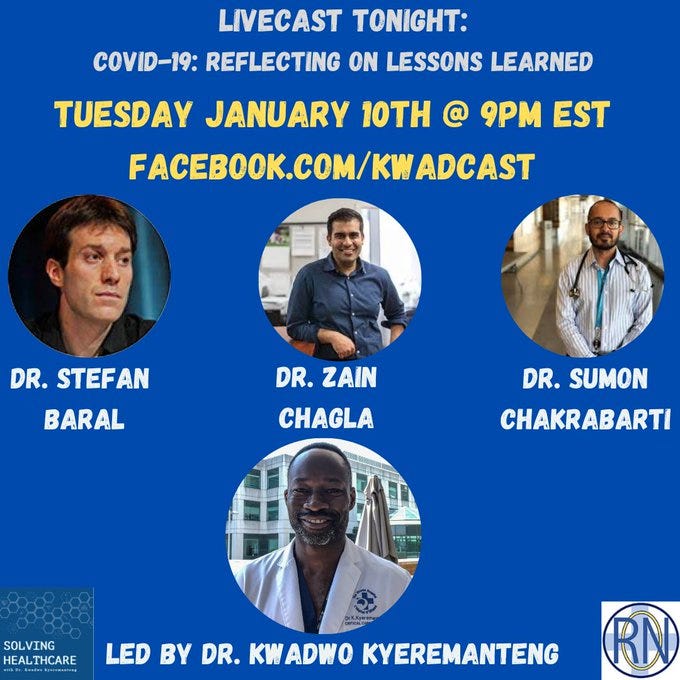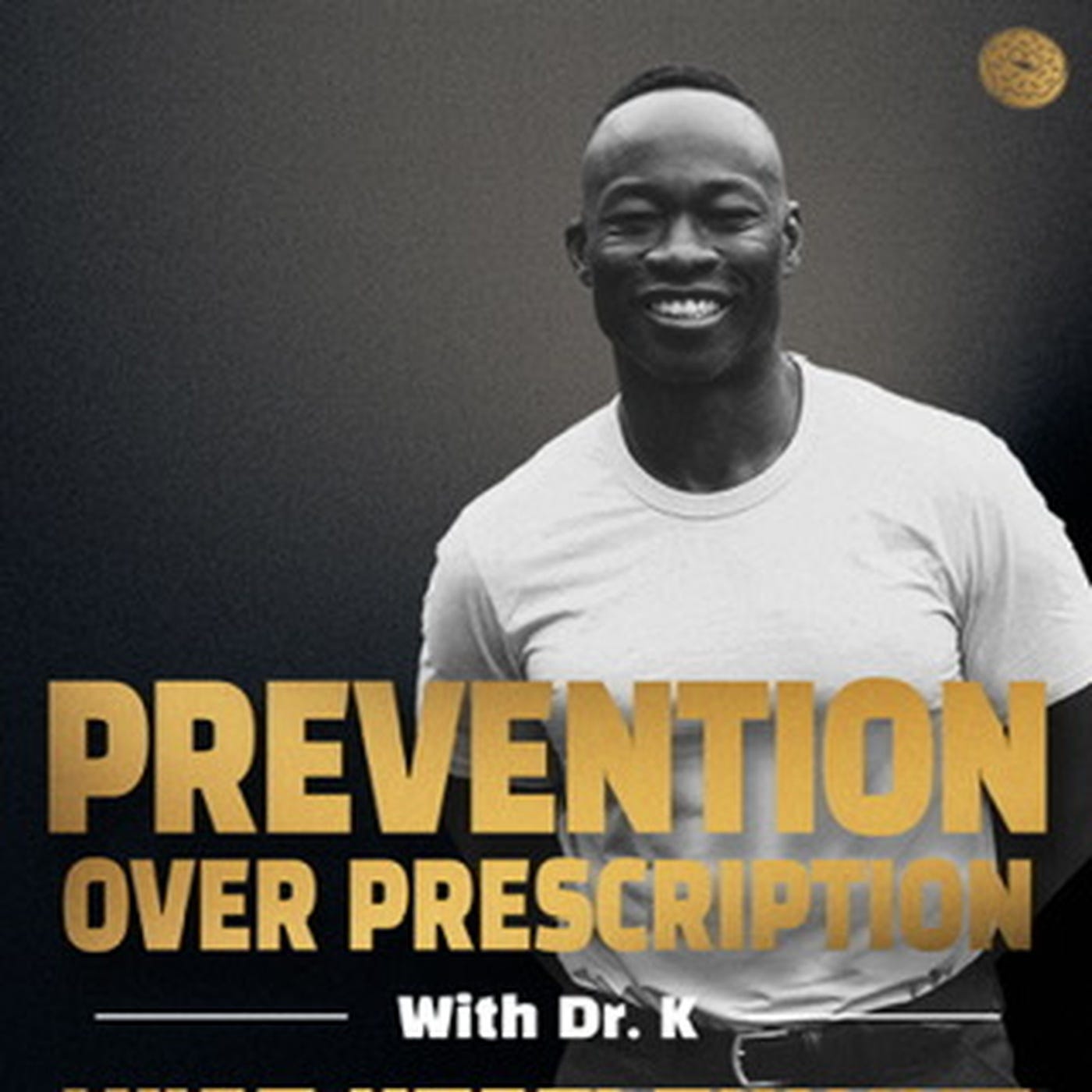#220 Lessons From The Pandemic with Drs. Chagla, Baral & Chakrabarti (The Last Dance)
Description
Episode Summary
In this livecast episode, we welcome back Dr. Zain Chagla, Dr. Stefan Baral, and Dr. Sumon Chakrabarti to address some of the issues we've seen throughout the pandemic, new variants and what to expect with future variants, discussing what we've done well over the past few years, misinformation, the effect of social media and the messaging on Twitter, the role media plays and the influence of experts on policy, public health agencies, booster shots to combat new variants and who actually needs them, where we are at with public trust, and much more!
SHOW SPONSOR
BETTERHELP
BetterHelp is the largest online counselling platform worldwide. They change the way people get help with facing life's challenges by providing convenient, discreet and affordable access to a licensed therapist. BetterHelp makes professional counselling available anytime, anywhere, through a computer, tablet or smartphone.
Sign up today: http://betterhelp.com/solvinghealthcare and use Discount code “solvinghealthcare"
Thanks for reading Solving Healthcare with Dr. Kwadwo Kyeremanteng! Subscribe for free to receive new posts and support my work.
Thank you for reading Solving Healthcare with Dr. Kwadwo Kyeremanteng. This post is public so feel free to share it.
Transcript:
KK: Welcome to ‘Solving Healthcare’ I’m Kwadwo Kyeremanteng. I'm an ICU and palliative care physician
here in Ottawa and the founder of ‘Resource Optimization Network’ we are on a mission to transform
healthcare in Canada. I'm going to talk with physicians, nurses, administrators, patients and their
families because inefficiencies, overwork and overcrowding affects us all. I believe it's time for a better
health care system that's more cost effective, dignified, and just for everyone involved.
KK: All right, folks, listen. This is the first live cast that we have done in a very long time, probably a year.
Regarding COVID, we're gonna call it a swan song, folks, because I think this is it. I'm gonna be bold and
say, this is it, my friends. I think what motivated us to get together today was, we want to learn, we
want to make sure we learned from what's gone on in the last almost three years, we want to learn that,
in a sense that moving forward the next pandemic, we don't repeat mistakes. We once again, kind of
elevate the voices of reason and balance, and so on. So, before we get started, I do want to give a
couple of instructions for those that are online. If you press NL into the chat box, you will be able to get
this. This recording video and audio sent to you via email. It'll be part of our newsletter. It's ballin, you'll,
you'll get the last one the last hurrah or the last dance, you know I'm saying second, secondly, I want to
give a quick plug to our new initiative. Our new newsletters now on Substack. Everything is on there
now our podcasts our newsletter. So, all the updates you'll be able to get through there. I'm just going
to put a link in the chat box. Once I find it. Bam, bam, bam. Okay, there we go. There we go. That's it
right there, folks. So, I feel like the crew here needs no introduction. We're gonna do it. Anyway, we got
Dr. Zain Chagla, we got Dr. Stef Baral, we got Dr. Sumon Chakrabarti back in full effect. Once again, like I
said, we were we chat a lot. We were on a on a chat group together. We were saying how like, we just
need to close this out, we need to address some of the issues that we've seen during the pandemic. Talk
about how we need to learn and deal with some of the more topical issues du jour. So, I think what we'll
start with, well get Sumon to enter the building. If you're on Twitter, you're gonna get a lot of mixed
messages on why you should be fearful of it or why not you should be fearful of it. So, from an ID
perspective, Sumon what's your what's your viewpoint on? B 115?
SC: Yeah, so, first of all, great to be with you guys. I agree, I love doing this as a as a swan song to kind of
move to the next stage that doesn't involve us talking about COVID all the time. But so yeah, I think that
we've had a bit of an alphabet soup in the last year with all these variants. And you know, the most one
of the newest ones that we're hearing about recently are BQ 1, xBB. I think that what I talked about
when I was messaging on the news was taking a step back and looking at what's happened in the last 14
months. What that is showing us is that we've had Omicron For this entire time, which suggests a level
of genomic stability in the virus, if you remember, variants at the very beginning, you know, that was
synonymous with oh, man, we're going to have an explosion of cases. Especially with alpha for the GTA
delta for the rest of, of Ontario, and I'm just talking about my local area. We saw massive increases in
hospitalizations, health care resources, of patients having been sent all over the province. So, it was it
was awful, right. But you know, I think that was a bit of PTSD because now after anybody heard the
word variant, that's what you remember. As time has gone on, you can see that the number of
hospitalizations has reduced, the number of deaths has reduced. Now when omicron came yeah, there
was an explosion of cases. But you know, when you look at the actual rate of people getting extremely ill
from it, it's much, much, much less. That was something that, you know, many of us were secretly
thinking, Man, this is great when this happened. So now where we are is we're in January 2023, we've
had nothing but Omicron, since what was in late November 2020, or 21? Maybe a bit later than that.
And x BB, if you remember, be a 2x BB is an offshoot of BH two. Okay. Yeah, if you're noticing all these
new variants are their immune evasive, they tend to be not as they're not as visually as, I see this in my
own practice, like all of us do here. You know, they are, well, I'm kind of piecemeal evolution of the
virus. Now, there's not one variant that's gonna blow all the other ones out of the water, like Oh, micron
did or delta. Right. I think this is a good thing. This is showing that we're reaching a different stage of the
pandemic, which we've been in for almost a year now. I think that every time we hear a new one, it
doesn't mean that we're back to square one. I think that this is what viruses naturally do. And I think
putting that into perspective, was very important.
KK: Absolutely. Zain just to pick your brain to like, I got this question the other day about, like, what to
expect what future variants like, obviously, is there's no crystal ball, but someone alluded to the idea
that this is what we're to expect. You feel the same?
ZC: Yeah, absolutely. It's interesting, because we have not studied a Coronavirus this much, you know, in
history, right. Even though we've lived with coronaviruses, there probably was a plague of
coronaviruses. What was the Russian flu is probably the emergence of one of our coronaviruses are
seasonal coronaviruses. You know, I think we had some assumptions that Coronavirus is when mutate,
but then as we look to SARS, cov two and then we look back to see some of the other Coronavirus has,
they’ve also mutated quite a bit too, we just haven't, you know, put names or other expressions to
them. This is part of RNA replication of the virus is going to incorporate some mutations and survival of
the fittest, the difference between 2020, 2021, 2022, and now 2023 is the only pathway for this virus to
keep circulating is to become more immune evasive. This is what we're seeing is more immune evasion,
we're seeing a variant with a couple more mutations where antibodies may bind a little bit less. But I
think that the big difference here is that that protection, that severe disease, right, like the COVID, that
we saw in 2020/2021, you know, that terrible ICU itis, from the COVID, you know, for the level of
antibody T cell function, non-neutralizing antibody functioning mate cell function, all of that that's built
into, you know, humanity now through infection, vaccine are both really, you know, the virus can evolve
to evade some of the immunity to cause repeat infections and, you know, get into your mucosa and
replicate a bit, the ability for the virus to kind of, you know, cause deep tissue infection lead to ARDS
lead to all of these complications is getting harder and harder and harder. That's us evolving with the
virus and that's, you know, how many of these viruses as they emerge in the population really have kind
of led to stability more than anything else? So, yes, we're going to see more variants. Yes, you know, this
is probably what what the future is, there will be some more cases and there may be a slight tick in
hospitalizations associated with them. But again, you know, the difference between 2020/2021/2022/
2023 is a syrup prevalence of nearly 100%. One way or another, and that really does define how this
disease goes moving forward.
KK: Yeah, absolutely. Maybe Stef we could pipe it a bit on, the idea that, first of all, I just want to
reinforce like as an ICU doc in Ottawa with a population of over a million we really have seen very little
COVID pneumonia since February 2022. Very minimal and it just goes to show know exactly what
Sumon and Zain were alluding to less virulent with the immunity that we've established in the
community, all reassuring science. One question I want to throw towards Stef, before getting into it. You
did an interview
























